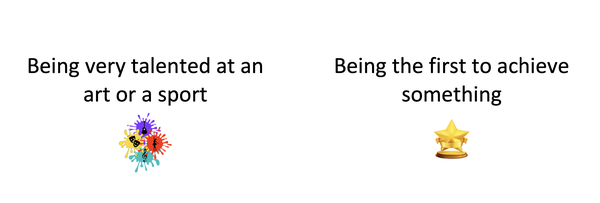The prospect of being famous has always excited people, and in an age of vloggers, influencers and talent shows, it’s probably never felt more possible.
So this week, a range of activities to explore the connections between fame, excellence and reward. Are famous people better than the rest of us? Would it be better to be famous without being rewarded, or vice-versa? I think I got a bit carried away with this one, so there’s plenty to choose from!
Also, scroll down to the PS for a couple of upcoming courses.
The Fame-ometer
Are some forms of fame better than others? This idea came out of conversations with students on a recent hiking expedition. Refreshingly, or worryingly, this group ranked “Tiktok famous” only marginally above being a serial killer…
Split your class into groups of 3-4 and give each a “Fame-ometer” (also attached). Challenge them to order the cards from what they would most like to be famous for, to what they would least like to be famous for.


The list in full:
- Making a groundbreaking discovery
- Selected at random to be a child star
- For posting videos to social media
- Being a relative of someone famous
- Being a politician
- Being very talented at a sport or art
- Being the first to achieve something
- Standing up for a worthy cause
- Running a business empire
Once they’re done, get them to think of categories not yet on the -Ometer, and let them decide where these sit. Of course, they can break the rules and have two or more on the same level. They can also overlap the cards, to show how one can be fractionally ahead of another.
It’s important to stress that the ordering is about being famous for that thing, rather than just doing it. But this itself leads to an interesting question: if fame wasn’t attached to any, would they order them differently?
Other follow-up discussion questions:
- Why do people want to be famous?
- What would stop people wanting to be famous?
- What could be both the best thing about being famous, and the worst at the same time?
- Who should be famous, but aren’t? (particular people, or groups of people).
- Who is famous, but shouldn’t be?
- What’s the difference between what people do get famous for, and what they should get famous for?
- What’s the difference been fame and notoriety?
- Is fame itself a skill?
Thinkers game: What would it be?
If fame was a colour, what would it be?
…an animal?
…a sound?
…a shop?
Question the quote:
In 1968, Andy Warhol said “in the future, everyone will be famous for fifteen minutes.” Was he right?
“The only thing worse than being talked about is not being talked about,” said Oscar Wilde. Do people need fame?
“Today one is famous for being famous” – Malcolm Muggeridge. Who fits this category? Is it a good category to be in?
“Fame is a poison most would drink happily despite the warning of a slow and miserable death” – the poet Atticus. Is that true? And is it true for you?
Philosopher Alain de Botton says our desire for fame is borne from a lack of love and recognition in our everyday lives, and if we showed each other more attention, our desires for fame would decrease. Do you agree?
“Fame for me is not external, it’s internal. So I’ve been famous for a long time.” – Lady Gaga. Is this a good way to look at fame?

What if… worlds
What would the world be like if everyone was famous?
What if nobody was famous?
What if fame offered you no money. Would you take it?
Would you rather…
…be famous for fifteen minutes, a day, a year, or a lifetime? Or never?
…fame recognise your life’s work, or be thrust into the spotlight with little effort?
…get super famous for a short time, or be slightful famous for a long time?
To preach or not to preach?
We’ve designed these activities to encourage discussion about fame without any over-arching moral messages.
Of course, many young people will need a dose of reality on topics like this, or at least a sobering adult perspective telling them fame is rarely all it’s cracked up to be. But we should be careful not to do this in a way that shuts, or shouts, anyone down. P4C presents a chance for children to express their genuine thoughts without risk of being told they’re wrong (with exceptions made for factual misinformation, or stuff that goes wildly against the school’s values). So in a P4C session, it’s best to limit yourself to faciliation moves that stop you putting your own oar in, such as encouraging contrasting points of view, or if there’s still lack of disagreement, ask them all to do a “brainstand” and argue the opposite. Or playing devil’s advocate, and doing so with a self-deprecating shrug that suggests you don’t know it all.
Many schools use what’s said in P4C discussions to help inform what they might need to teach more of in personal, social and health education (PSHE in the UK). Even in these lessons, it’s best to steer clear of blanket, pessimistic assertions – not only could you look a bit of a curmudgeon, but there are plenty of celebrities who say they quite like their fame!
Further stimuli
This is a good collection of views from famous women. The general take of celebrities seems to be one of gratitude for all the perks, but also deep confusion – fame appears to leave most people a bit of a mess for a while. For older students aware, a discussion about how men and women experience fame differently might be worth exploring.
Liverpool footballer Trent Alexander Arnold’s new initiative to support young players released by their clubs. 0.012% of children playing organisesd youth football make it as a pro.
An article detailing some celebrities using their status to further charitable causes.Though most big names have some philanthropic work on their Wikipedia page. Do celebrities have an obligation to use their power (and their wealth) wisely?